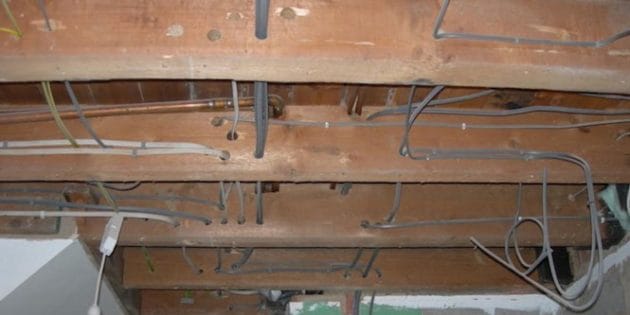
The 7 Checks You Can Do to Know If You Need A Full or Part House Rewire
Over time, it may become evident that your home wiring is not fit for purpose and it’s time to carry out full or part rewiring. This will ensure that your electric systems are compliant with safety regulations and less prone to failure.
All our recommended electricians have all the training, qualifications and experience to ensure that this work is carried out to a high standard and to regulation.
All of the electrical installations will be fitted to the highest safety standards and be compliant with all applicable industry standards, such as the BS7671 Wiring Regulations and Part P building regulation requirements.
Let’s take a closer look at a full and part house rewiring and some of the issues involved to help better understand what you may need.
How Do You Know if Your Home Needs Rewiring?
There are seven main reasons why you might want to consider a full or part rewire for your home.
These reasons are primarily based on safety issues that can arise over time, and your electrical installation can also become no longer fit for its intended purpose.
- 1. General Wear and Tear
Many homeowners go for years without having their homes checked by a qualified electrician.
Over time wiring, connections and parts can deteriorate and become less effective and even dangerous to use.
- 2. Electrical Shocks
If you’re experiencing electrical shocks from contact with certain appliances or fixtures in your home, this is a sure sign that your electrics have become unsafe.
This is thankfully a rare occurrence, but it requires urgent attention.
- 3. Cracked Insulation
Ageing electrical wiring can have cracked insulation that can cause a variety of problems.
Newer PVC cable insulation is relatively hassle free, but older electric cables may be covered with rubber. Over time, rubber can dry out, and cracks will form meaning the cables will need to be replaced.
- 4. Damaged Insulation
Electrical cable insulation can also occur for reasons other than cracking. Even newer cables can be damaged because of wear and tear or even accidental damage during a DIY project.
Effective insulation is essential for safety and a part rewire may be required to make the wiring safe to use.
- 5. Outdated Wiring
The electrical wiring in your home may be configured to a standard that is now outdated.
As an example: a property wired prior to 1966 would have no Earth in a lighting circuit, and that would make it incompatible with the vast majority of modern light fittings.
Some limited Class 2 lighting fixtures may be compatible, but it would be a better idea to rewire the property instead if this is the case.
- 6. Fire Damage
If the home has been damaged in a fire, this can permanently undermine the electrical safety of the installation.
In this case, an extensive rewire for the home is essential to make the system safe to use again.
- 7. Not Fit for Purpose
If your circuit breaker is tripping or fuses are blowing on a consistent basis, this is a warning that your electrical installation cannot cope with the demand.
This could have occurred due to a recent extension or because of heavier appliance usage.
Perhaps there are too few power outlets, and more multi socket adaptors or extension cables are being used. If this is the case, it can be dangerous and it would be advised for it to be checked for safety.
Electrical Rewiring Concerns
Rewiring your home will involve changing some or perhaps all of the components of your home electrical system. This could include your circuits, sockets and consumer units.
However, a full rewire will only be carried out by our recommended electricians when it’s absolutely necessary.
This kind of work does involve a degree of disruption as electrical cabling would need to be channeled in the walls, so some plastering and decorating may be required afterwards.
This is why we always recommend for an electrician to come round and have a look at your homes electrical to advise you on which option is best before going ahead.
If you’d like to speak to our recommended and vetted electrician in your area about your homes electrics, you can find them here.
Need Your House Rewired?
Popular Local Electricians
Need Your House Rewired?
Recent Reviews About The Electricians
Overall Rating:
Based on 1460 reviews
Amazing service, came to give us a quote on the same day and then started the next day. Chris was super helpful and efficient, got the job done in one day. Really great standard of work, definitely recommend!
Lorna Yates
Great help. Couldn't fix the problem but solved what was wrong so can get the help needed.
Wendy
Great job, quick and efficient, came in looked at the job and gave a quote and did it on the spot. I know who to call in the future.
Georgie Wilson
Sent request for call back x half an hour later x call back x and to my amazement booked me in the next day x my mum was over the moon xx excellent service from start to finish x highly recommend x 5 * service
Sandra Pillibg
ARRIVED AS PER SUGGESTED TIME AND DATE. DISCUUSSED REQUIREMENTS AND SUGESTED POSSIBLE ALTERNATIVES, IS TO CONFIRM IN EARLY COURSE. FOLLOWING SHORT BREAK WHICH HAD PREVIOUSLY BEEN ARRANGED.. THANK YOU.
Albert Routledge
I'm very pleased with the work carried out I've had 3 other electricians who said they would do the job but not come back even though I rang them several times would like to say thank you once again.
Monica
Really friendly great job and reasonably priced
Caroline Rajek
Prompt service, polite & efficient contractor
Bob Marchant
Very good job
Nigel
My Trusted Expert Guarantee
Experts Have Been Vetted & Approved